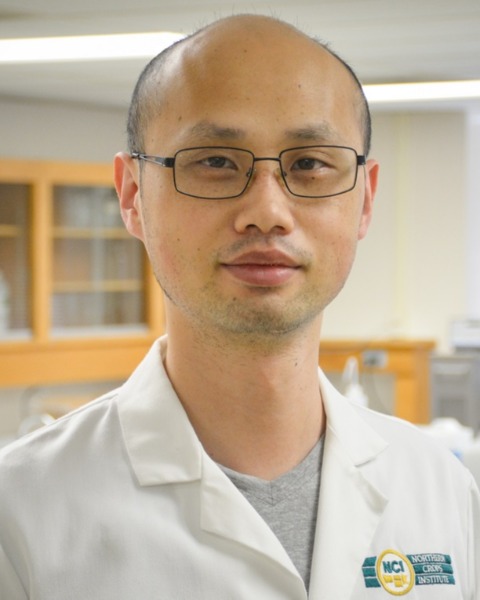2025 AOCS Posters
Protein and Co-Products
Mechanistic Investigation of Chlamydomonas reinhardtii-Derived Hydroxyproline-Rich Peptides in Stimulating Intestinal Nonheme Iron Absorption

Shiyang Li, PhD
Postdoctoral scholar
North Dakota State University
FARGO, ND, United States- HW
Haohao Wu
Professor
Ocean University of China
QINGDAO, Shandong, China (People's Republic) 
Minwei Xu, PhD
Assistant Professor
North Dakota State University
FARGO, North Dakota, United States
Presenting Author(s)
Co-Author(s)
Abstract:
Dietary iron deficiency is among the five greatest causes of years lived with disability, and is the leading cause of years lived with disability among women across 35 countries. Current supplementation/fortification practices are proving ineffective and pose potential intestinal infection risks. Therefore, it is desirable to explore new alternative strategies to tackle iron deficiency. The stimulation of host iron absorption is a promising anti-anemia strategy adjunctive/alternative to iron intervention. The O2-dependent hydroxylation of proline residues in the α subunit of hypoxia-inducible factor (HIF) by prolyl hydroxylases (PHD) is central to the hypoxic response, and PHD inhibition has been demonstrated as a novel paradigm to stimulate intestinal iron absorption.
Here, Chlamydomonas reinhardtii (C.reinhardtii) containing 3% hydroxyproline-rich protein with repetitive X-(Pro/Hyp)n motifs was found to increase iron reduction, uptake, and transport, to upregulate duodenal cytochrome b (Dcytb), divalent metal transporter 1 (DMT1), ferroportin, and hephaestin, to inhibit PHD, and to stabilize HIF2α in polarized Caco-2 cell monolayers in a dose-dependent manner, and this was dependent on its protein fraction, rather than the polysaccharide fraction. LC-MS detected three abundant C. reinhardtii-derived hydroxyproline-containing dipeptides showing desirable docking affinity energy against PHD3 in the lysates of polarized Caco-2 cell monolayers. These peptides also showed both competitive and uncompetitive inhibition of recombinant human PHD activity in in vitro enzyme inhibition assays and isothermal titration calorimetry interaction experiments. After 2 h of intragastric administration in rats, C. reinhardtii-derived peptides also acutely increased duodenal HIF2α stability and Dcytb, DMT1, ferroportin, and hephaestin transcription.
Overall, C. reinhardtii-derived hydroxyproline-rich peptides stimulate intestinal iron absorption via PHD inhibition, HIF2α stabilization, and subsequent upregulation of iron transport proteins. These results suggest that C. reinhardtii-derived hydroxyproline-rich peptides represent a promising natural strategy to enhance intestinal iron absorption and combat iron deficiency.

.png)